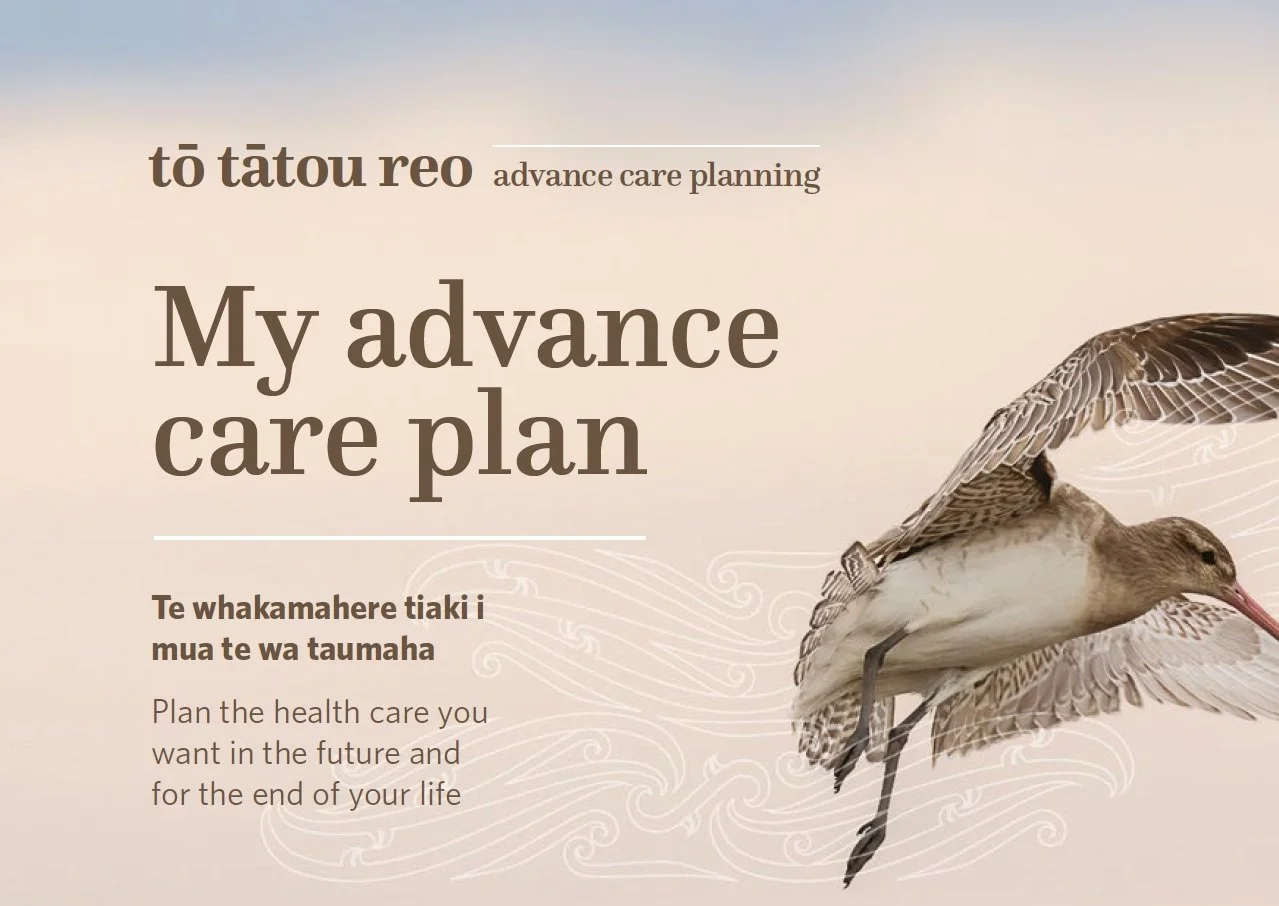Advance Care Planning
Advance care planning is a process of thinking and talking about your values and goals and what your preferences are for your current and future health care. Advance care planning is for people who are well, people who are unwell, and people in their last days of life.
Advance care planning in New Zealand
Once you’ve thought about and talked about what matters most, write down your wishes in an advance care plan. This helps your whānau and health care team understand what is most important to you and make sure your care reflects your values.
Health New Zealand have developed a national template especially for New Zealanders so they can share their advance care planning preferences with their family, friends and healthcare team.

Do Not Attempt CPR (DNACPR) Orders
“Do Not Attempt CPR” (DNACPR) orders can be part of advance care planning, and they specify that cardiopulmonary resuscitation should not be attempted if a person’s heart and breathing stop. These orders are made when CPR is deemed inappropriate or against the wishes of the individual.
Patients who experience cardiac arrest in hospital are rarely more than a minute or two away from defibrillation. But the proportion of shockable rhythms in these patients is low as the heart has typically stopped after the decline of other systems. In such conditions, chest compressions are more likely to cause unnecessary trauma than improve survival outcomes.
As retired UK palliative care physician Kathryn Mannix explains, “cardiac arrest” was originally reserved for unexpected events in relatively healthy individuals in the community. She says we need to separate this from the more progressive phenomenon that is better described as “natural dying”.

Frequently Asked Questions
It can be a good idea to discuss your advance care planning thoughts with family, friends, doctors and specialists to help make informed decisions. Once you know what you want, writing your wishes down will make it easier for family and health care teams to know your wishes, especially if you are not able to tell them yourself. This creates peace of mind for you and your loved ones.
Download the advance care planning guide which will walk you through everything you need to know, and think about, to make the process of recording and sharing your plan easier. Contact your local advance care planning team to find out about attending community advance care planning sessions to help facilitate important discussions around your future health care and read stories about other Kiwi’s advance care planning journeys.
It can be helpful to review your advance care plan regularly as your thoughts around treatment may change if you have changes in your situation. You may also decide to share with someone new. A good idea is to choose an annual review date, perhaps on your birthday or on another significant date.
A living will sets out specific medical treatments you do or don’t want. It commonly covers life-sustaining treatment (eg. resuscitation, ventilation, feeding tubes) and applies only in certain situations (eg terminal illness, permanent unconsciousness). A living will can be part of your advance care plan. Many people start with an advance care plan (values first), then include or add a living will for clarity on major medical decisions.
– What is important to you and what gives your life meaning. This might be cultural or religious beliefs or personal beliefs such as what suffering means to you.
– Specific concerns or fears you have about your future and getting older
– How you like to make decisions and what it would look like to have someone else make decisions for you
– Any treatments or types of care that you would or wouldn’t want
– Who you would want to make decisions on your behalf if you weren’t able to
– If there was a choice, how and where you would like to spend your last days
To establish your plan as an official document, you need to discuss it with a healthcare professional and include their contact details and signature on your plan. Doing this confirms that you were competent at the time you created your plan, that you discussed care choices you might face, that you based your plan on adequate information and that your plan was made voluntarily.
To get your advance care plan added to your medical record – for your family doctor (GP) and healthcare providers to access, contact your local Health New Zealand advance care planning team. Each district has a different process for storing and sharing advance care plans.
End of Life Doulas can help you to design your best last chapter and can assist with Advance care plans and Directives for what you want – or don’t want – in case of a severe medical event or accident where you cannot communicate.
How do I store and share my plan?
Once you have written down what is important to you and what you want to happen, it is important to share your plan with friends and family and let them know where you keep your most recent copy. It can be a good idea to choose a time to review your plan each year, perhaps around your birthday or another significant date. If you have an Enduring Power of Attorney, it is important for them to also know about your plan and have a copy.
To establish your plan as an official document, you need to discuss it with a healthcare professional and include their contact details and signature on your plan. Doing this confirms that you were competent at the time you created your plan, that you discussed care choices you might face, that you based your plan on adequate information and that your plan was made voluntarily.
To get your advance care plan added to your medical record – for your family doctor (GP) and healthcare providers to access, contact your local Health New Zealand advance care planning team. Each district has a different process for storing and sharing advance care plans.
